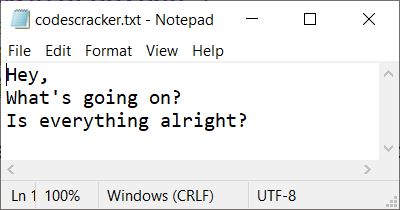- PHP Basics
- Learn PHP
- PHP Comments
- PHP Data Types
- PHP Variables
- PHP Operators
- PHP echo
- PHP print
- PHP echo vs. print
- PHP if else
- PHP switch
- PHP for Loop
- PHP while Loop
- PHP do...while Loop
- PHP foreach Loop
- PHP break and continue
- PHP exit()
- PHP exit() vs. break
- PHP isset()
- PHP Arrays
- PHP print_r()
- PHP unset()
- PHP Strings
- PHP Functions
- PHP File Handling
- PHP File Handling
- PHP Open File
- PHP Create a File
- PHP Write to File
- PHP Read File
- PHP feof()
- PHP fgetc()
- PHP fgets()
- PHP Close File
- PHP Delete File
- PHP Append to File
- PHP Copy File
- PHP file_get_contents()
- PHP file_put_contents()
- PHP file_exists()
- PHP filesize()
- PHP Rename File
- PHP fseek()
- PHP ftell()
- PHP rewind()
- PHP disk_free_space()
- PHP disk_total_space()
- PHP Create Directory
- PHP Remove Directory
- PHP Get Files/Directories
- PHP Get filename
- PHP Get Path
- PHP filemtime()
- PHP file()
- PHP include()
- PHP require()
- PHP include() vs. require()
- PHP mysqli Tutorial
- PHP mysqli Tutorial
- PHP and MySQL Setup
- PHP mysqli: Create Database
- PHP mysqli: Create Table
- PHP mysqli: Insert Record
- PHP mysqli: Update Record
- PHP mysqli: Fetch Record
- PHP mysqli: Delete Record
- PHP mysqli: SignUp Page
- PHP mysqli: LogIn Page
- PHP mysqli: Store User Data
- PHP mysqli Functions
- PHP mysqli_connect()
- PHP mysqli_close()
- PHP mysqli_connect_errno()
- PHP mysqli_connect_error()
- PHP mysqli_query()
- PHP mysqli_fetch_row()
- PHP mysqli_fetch_assoc()
- PHP mysqli_fetch_array()
- PHP mysqli_free_result()
- PHP mysqli_error()
- PHP mysqli_prepare()
- PHP mysqli_stmt_bind_param()
- PHP mysqli_stmt_execute()
- PHP mysqli_stmt_fetch()
- PHP mysqli_stmt_store_result()
- PHP mysqli_stmt_num_rows()
- PHP mysqli_stmt_bind_result()
- PHP mysqli_stmt_get_result()
- PHP mysqli_result class
- PHP mysqli_report()
- PHP error_reporting()
- PHP mysqli_real_escape_string()
- PHP htmlspecialchars()
- PHP Misc Topics
- PHP Object Oriented
- PHP new Keyword
- PHP header()
- PHP getallheaders()
- PHP Cookies
- PHP Sessions
- PHP Date and Time
- PHP GET vs. POST
- PHP File Upload
- PHP Image Processing
PHP fread(): Read a File
The PHP function fread() is used when we need to read the content of an opened file using its pointer. For example:
<?php
$fp = fopen("codescracker.txt", "r");
$content = fread($fp, 4);
echo $content;
fclose($fp);
?>
The output produced by the above PHP example using the fread() function is:

Since I've specified 4 as the file length, read only the first 4 characters of the file. Therefore, the output produced by the above example is "Hey,". That is the first four characters of the file codescracker.txt. Here is a snapshot of the file, codescracker.txt:

PHP fread() Syntax
The syntax of the fread() function in PHP is:
fread(filePointer, length)
Both parameters are required. The filePointer refers to the file pointer, whereas the length parameter is used to specify the length of characters to read from the file.
If you want to read the complete content of a file, then you can use the filesize() function to calculate the size of an unknown file and apply it as the length parameter. For example:
<?php $file = "codescracker.txt"; $fp = fopen($file, "r"); $content = fread($fp, filesize($file)); echo $content; fclose($fp); ?>
Now the output of the above PHP example should be:

Here is the modified version of the above example:
<?php
$file = "codescracker.txt";
$fp = fopen($file, "r");
if($fp)
{
$content = fread($fp, filesize($file));
echo $content;
fclose($fp);
}
else
echo "<p>Unable to open the file</p>";
?>
PHP Read a File Line by Line
To read a file, line by line, use feof() followed by fgets() in this way:
<?php
$file = "codescracker.txt";
$fp = fopen($file, "r");
if($fp)
{
while(!feof($fp))
{
$line = fgets($fp);
echo $line;
echo "<br>";
}
}
else
echo "<p>Unable to open the file</p>";
?>
The output of the above PHP example should be:

PHP Read a file character by character
To read a file character by character, use feof() followed by fgetc() in this way:
<?php
$file = "codescracker.txt";
$fp = fopen($file, "r");
if($fp)
{
while(!feof($fp))
{
$character = fgetc($fp);
if($character == "\n")
echo "<br>";
else
echo $character;
}
}
else
echo "<p>Unable to open the file</p>";
?>
You will get the exact output as in the previous example.
« Previous Tutorial Next Tutorial »